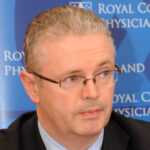The Medical Council’s upcoming Medical Workforce Intelligence Report 2021, “will definitely highlight the need for a workforce strategy for healthcare,” the Council’s CEO Mr Leo Kearns stated earlier this month.

Speaking on 8 April at the Medical Professionalism Conference 2022, hosted by the RCSI University of Medicine and Health Sciences, Mr Kearns ended his presentation with a slide and comments on the still unpublished report.
Mr Kearns said “this year what we are attempting to do is to identify what those key risks are relating to patient safety and the key strategic actions needed to address those risks… and it will definitely highlight the need for a workforce strategy for healthcare”.
Earlier in his talk, Mr Kearns said a comprehensive medical workforce strategy was required. The strategy should address “immediate critical issues” such as European Working Time Directive compliance and medium- to long-term requirements in regard to consultant numbers and the ratio of trainee to non-trainee doctors.
A Medical Council spokesperson told the Medical Independent that the new Medical Workforce Intelligence Report is due to be published in “early May”.
According to Mr Kearns’ slides, the upcoming report will set out the “critical risks to patient safety emerging from the data analyses and key strategic actions necessary to support the development of a healthcare workforce strategy”.
“It will highlight why a healthcare workforce strategy is required to address recruitment, retention, distribution, and supply challenges.”
Also speaking at the RCSI conference, Medical Council President Dr Suzanne Crowe told online delegates that “it is clear that we have to address the shortages in our workforce, we do not have enough people to deliver care and that is a major concern to the Council”.
“We are strongly petitioning for a workforce strategy to plan for the future of our health service, because at the Council we want to grow the next generation of doctors and ensure that they and their practice reach the highest standards for them and their patients into the future.”













Leave a Reply
You must be logged in to post a comment.